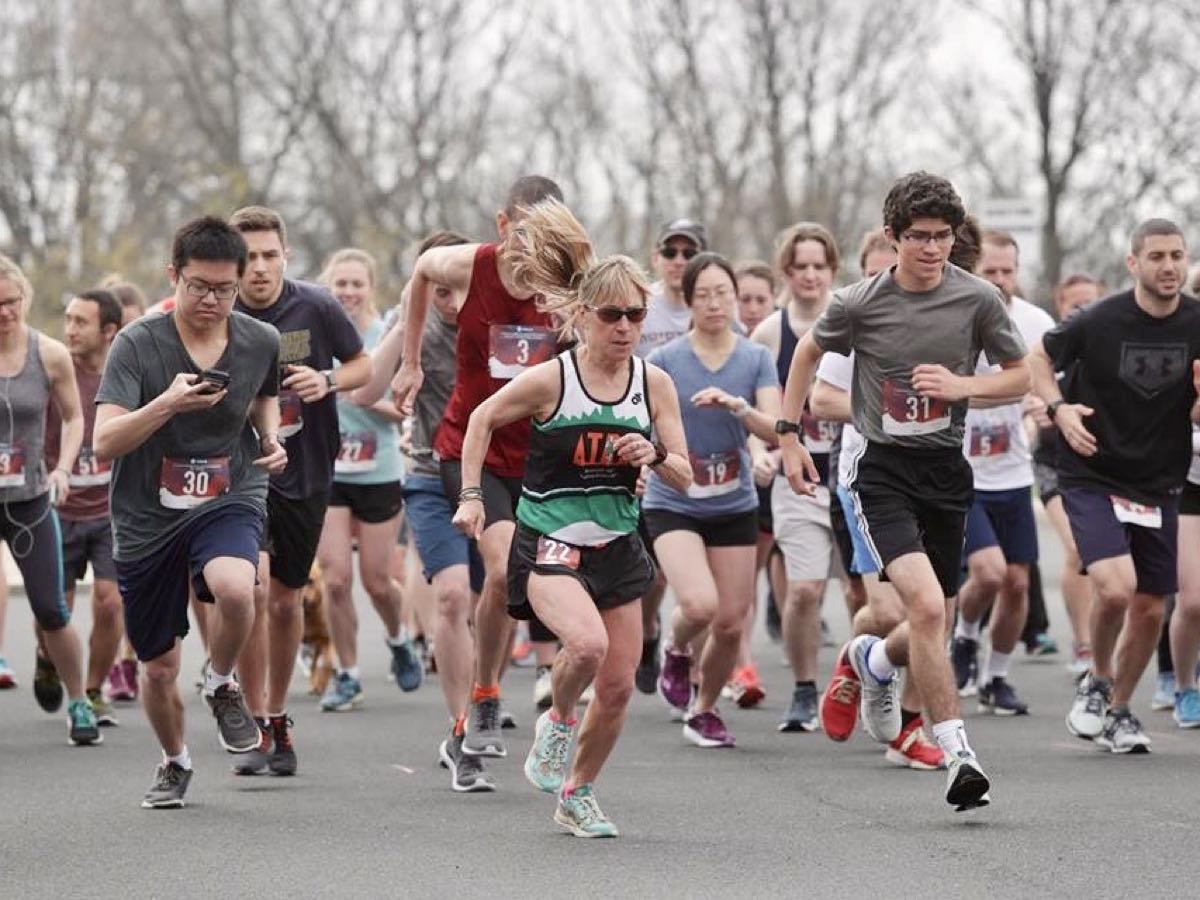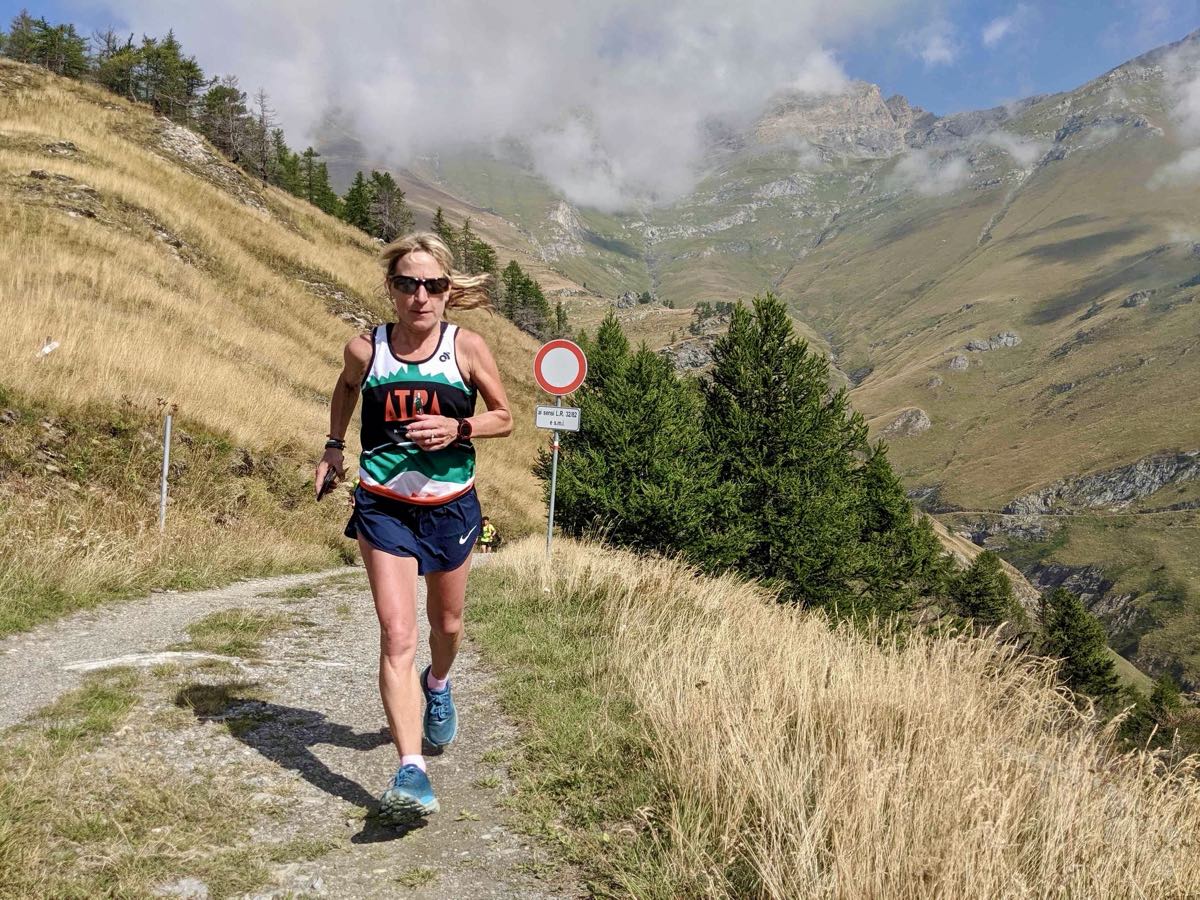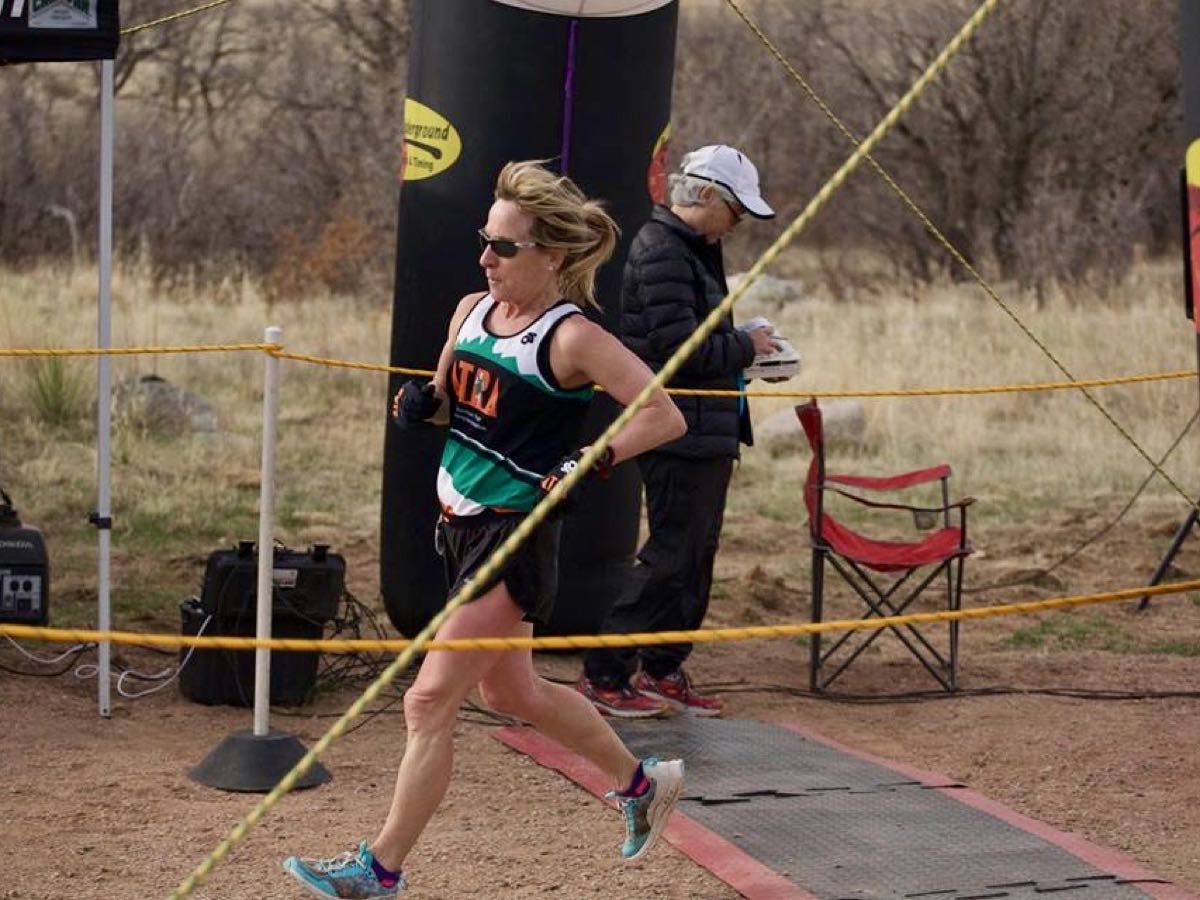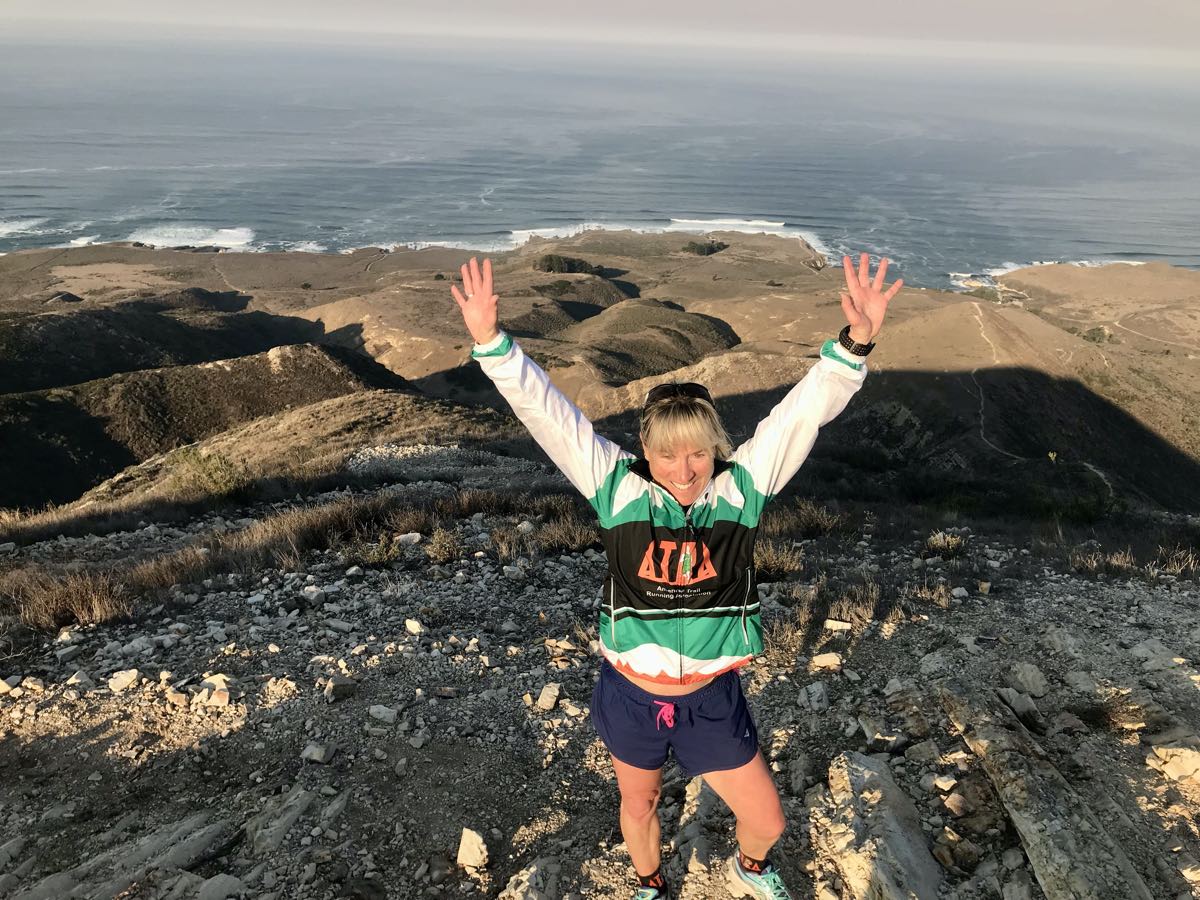‘Age-Old Runners’ is an article series where we explore runners’ performance potential after the age of 45 by interviewing excellent middle-aged runners. Is there still potential to improve? What roles do motivation, mindset, and specific training and recovery techniques play in allowing runners in their mid-forties to mid-sixties to continue to excel? To learn more about this series’ goals, check out its introductory article.
Nancy Hobbs just turned 60. She’s been running and racing consistently since the 1980s, so she’s about 40 years old as a runner. Before COVID-19, she often raced twice a month focusing on sub-ultramarathon distances, winning her age group more often than not. Nancy podiumed at both the 2013 and 2015 World Masters Mountain Running Championships, respectively finishing in third and second when she was 52 and 55 years old. She was also seventh at the 2018 Barr Trail Mountain Race, a race she co-founded with Matt Carpenter.
Nancy is also executive director of the non-profit American Trail Running Association (ATRA), which she founded in 1996. She helped build and raise funding for the first U.S. women’s team to attend the World Mountain Running Championships in 1995 and helped start the USA Junior Mountain Running Team.
Nancy also chairs the USATF Mountain Ultra Trail Council, which she helped create in 1998. She is the treasurer of the World Mountain Running Association, and she’s co-authored a number of books including The Ultimate Guide to Trail Running. In 2013, she was inducted into the Colorado Running Hall of Fame.
The following is a transcript of a phone interview with Nancy. It has been edited for brevity and clarity.
Do you believe runners over the age of 45 have the potential to improve? Can they get faster and race better?
It depends on how fast they have been running. If they weren’t running that much, and, now, they’re doing speedwork and more endurance training, they definitely can.
On the importance of confidence and experience.
You get older and there are different challenges, but there’s also more wisdom. You know more about who you are, what you are. You know what the tweaks are. You know your body better, and you know the results of running when you’re hurt. Instead of exacerbating the problem, you can eliminate it before it gets to a point where you can’t run at all.
I have more confidence about my running now than I did 20 years ago. I think that has to do with the commitment that I’ve made. I pay more attention to what I should be doing.
Why do older runners stop racing?
If you were once super competitive and winning all the time, then as you get older and slower, you think: I can’t be there on the podium. I can’t run as fast now as I once could. What’s the point? You have to reinvent how you look at your competitiveness and how you look at what makes you a runner now. When people no longer define you as an elite runner, they forget about you. But how do you define yourself? It’s so hard emotionally transitioning to that place.
And the other thing is, if you have other things in your life like family, obligations, work, whatever it is, your running might not be the top priority anymore.
I was never an elite runner, so I never went through having to compare myself…. I just feel better when I feel fit and healthy, and I’ve done a good effort. I can’t imagine just sitting around on the couch. That’s not part of who I am.
What psychological impact does not seeing older runners racing or training have?
I was on a call, and we were celebrating somebody’s birthday. He was turning 50, and everybody was giving advice about what you need to know as you get older. One guy says, “I go to the gym, and people say to me, ‘You don’t look 60.’ And I tell them, ‘I do look 60. I am 60. This is what 60 should look like.’” That really opened my eyes. I always get, “Oh, Nancy, you don’t look that old.” What am I supposed to look like?
When you don’t see images on websites or in magazines of people who look like you … it seems as if there is a message that you don’t matter, or that people who look like you don’t run…. If you don’t see people who are in your age group, you think: Oh, I guess we can’t do this anymore because we’re old.
On ageist stereotypes.
Why aren’t there 50, 60, and 70 year olds in ads? It doesn’t [all] have to be AARP [American Association of Retired Persons] ads: “Get ready to buy your life insurance and your long-term care insurance. And here’s a picture of a retirement village that you need to go to.” How does that incentivize?… I think you need to have imagery and stories that show I can do this.
Feature this age group in advertising and in articles. Showcase runners over 50. Share articles that speak to this age group from injury prevention to training ideas. People over 50 buy shoes, gear, apparel, and hydration products. Images of runners over 50 using products may translate to more sales [and participation] for this age group.
[Race directors can] offer age groups at least in five-year increments, consider age-graded racing, and offer prize money and/or cool awards. They can give discounted entries for older athletes. Aging athletes, if they are retired, may be on limited income.
How does racing with runners in your age group impact you?
At the World Mountain Running Champs, there are a lot of women in my age group who are super fast. And I think: Holy crap! Look at how fast they’re running! I’ll be out on a workout, and I’ll think: I’m not going to push it anymore. But then I’ll think: No! I want to beat that woman. It’s what you envision is possible. You think: If they can do that, why can’t I? I can work harder. I can do one more quarter or whatever it is.
How have your racing goals changed over time?
When I started, I would set time goals. I’m a competitive person. Period. Now, I look at racing a little differently. I feel confident that I can be a pretty good runner at 60. I never felt like I could be a really good runner at 30. I was just an okay runner. Now, I can do pretty well. I can beat some people. So I feel more confident in my competitive-running ability…. It’s fun to get an age-group record…. It gives you a reward for your effort and makes you feel like your training is paying off.
It’s easy to blame getting older when you’re having a bad race or hard training run. Do you ever think about your age when you’re racing?
No, I don’t think about it like that. Even if somebody passes me and they’re younger, I’m not thinking: Oh they’re younger, so they should beat me. I’m just going to back off. No, I’m going to run as hard as I can. And if they beat me, they beat me. I don’t look at it as, I can’t run any faster because I’m old.
Of course, sometimes you get done and you think: Why am I so tired the next day? I just did a pretty hard run on Saturday, and on Sunday I did my long run. Sunday I felt okay, but on Monday, I’m dragging.
What does your recovery look like after you’ve raced?
A lot of my recovery is active recovery. I’m a big proponent of getting in the pool. I’m in the pool just about every day. I do mostly pool running, but sometimes I’ll do a little side stroke to stretch out my muscle groups. I’ve probably been doing pool running for 15 years on a pretty regular basis.
I also do a lot more stretching, and I have a couple different foam rollers. I have a slant board. I key in on exercises I need for my body. As you get older, you have to focus on what your problems are and how you address them.
How much time do you spend every day doing preventative care?
If you include the pool work, I’d say at least two hours a day. I’m in the pool anywhere from 30 to 90 minutes.
When I was in my twenties and thirties, I’d get out of bed, put on my shoes, and go out the door. Now, I do exercises before I get out of bed. It sounds ridiculous, but I do some hip-flexor exercises. Then, I do my pushup and sit-up routine. I’ll do more stretching when I get back from my run. And, at night, before I go to bed, I do anywhere from 15 to 30 minutes of stretching and work…. I’ve got a [few back issues], so I do foam rolling on my back. And I do the exercises that my massage therapist gives me to really address those problems.
Does all that care keep you feeling 100%?
I’m not going to say that I’m never sore, or that I never hurt. Don’t get me wrong, I don’t feel 100% every day. I’m a little stiff when I get up some days… a lot of days. And when I go out and run, I’m not going to start out at seven-minute-mile pace. I’ve got to ease into it. It takes me a little bit longer to warm up than it used to. But I’m also doing a little more quality than I did before.
What is your training like on a typical week?
Sunday is my long run. Sometimes I do some pick-ups during my long run. Monday and Tuesday are recovery days. Wednesday, I do speedwork of some kind. Saturday, I try to do a race or speed time trial. So I’m doing three quality workouts a week. The others are not super fast. But, a lot of times, I’ll do some pick-ups at the end of those runs. So if I run 11-minute or 10-minute miles, I’ll do some pick-ups at the end of that because I want my muscles to remember they can run fast.
On the importance of speedwork.
A lot of times you think you just can’t run fast anymore. And granted, I can’t run 6:30-minute or six-minute miles back to back anymore. But that doesn’t mean I can’t strive to run as fast as I can. Again, you’ve got to do the work in order to run faster. You just can’t plod along and think you can run 6:30 or seven-minute miles. It just doesn’t happen.
How has your training changed over time?
In my thirties, I was running probably 50 to 60 miles a week. Now I run 35 to 40 miles a week.
I don’t run really long anymore. My body doesn’t like that very much. I haven’t done a 20-mile run in a long, long time. I don’t want to run that far because I think I’ll get too sore, and then I won’t be able to do my quality running. So, right now, I feel I can run decently fast, and I’d rather be doing that than going longer and slower. I like the feeling of running a little faster. As long as I can run fast, I want to keep running fast.
What advice would you give runners in their twenties and thirties if they want to keep running well through their fifties and later?
Get a good massage therapist. Any kind of body work: physical therapy, massage…. Identify what imbalances you might have and get them fixed. And if you have a tweak, listen to it, and don’t let it get to a full-blown injury.
Eat well. I think having a good relationship with food is really important…. I have a pretty good relationship with food. I didn’t always. A lot of women go through that. I think that is something you really need to get your head on straight about. And that’s something that you don’t just snap your fingers and it happens. I think you have to address those problems and talk about it. Reach out and say: “I don’t have a good relationship with food. I need help.”
Do you think that women who are racing in their fifties and older have a healthy relationship with food?
Some do. I think some don’t.
What is your diet like?
I don’t eat red meat. I haven’t since 1979. I don’t eat chicken. I eat fish maybe a couple of times a year. I eat mostly pasta, potatoes, things like that. I just started doing this collagen protein, which I think is helpful to get a little more protein.
I’m not one of those who only eats lettuce and carrots. I really like cookies, and I like tortilla chips. I eat dark chocolate. I like drinking wine. I don’t think: Oh, I can’t have that because it’s too many calories. I mean, I do watch what I eat. I think I eat pretty healthy.
Training specifics:
- Weekly running volume: Thirty-five to 40 miles a week
- Strength training: Core work daily
- Off-season: “Absolutely not.”
- Sleep: Eight to nine hours a night
- Race nutrition: Usually nothing during races
- Recovery: Two days off per week, pool running for 1.5 to two hours daily, 15 to 30 minutes of stretching and foam rolling daily
Three factors Nancy attributes her running performance to:
- Body awareness
- Consistent training
- Speedwork




